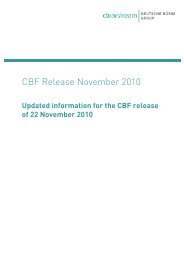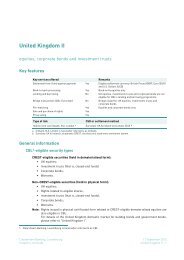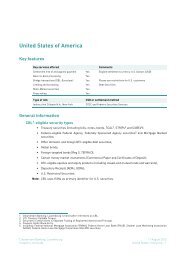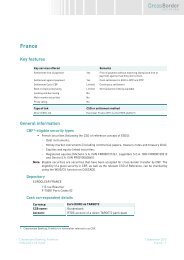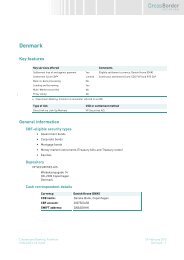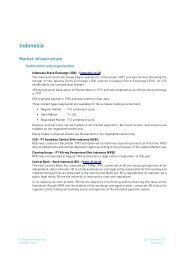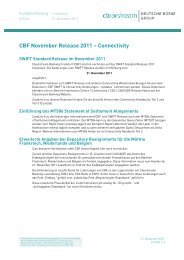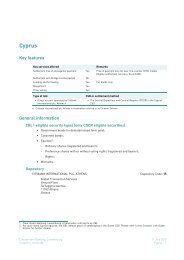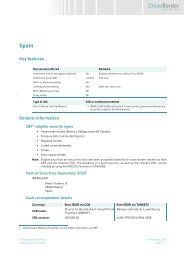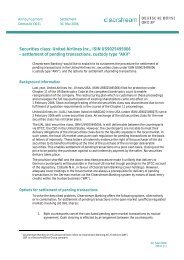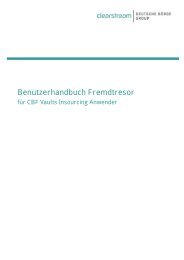An introduction to the European Post-Trade Market - Clearstream
An introduction to the European Post-Trade Market - Clearstream
An introduction to the European Post-Trade Market - Clearstream
Create successful ePaper yourself
Turn your PDF publications into a flip-book with our unique Google optimized e-Paper software.
On a national level, many countries have laws directly regulating post-trade services providers. These<br />
laws establish high standards for clearing and settlement, cus<strong>to</strong>dy, safekeeping, and <strong>the</strong> notary function.<br />
Examples of such legislation are <strong>the</strong> German “Depotgesetz” (Cus<strong>to</strong>dy Act) or <strong>the</strong> respective provisions<br />
in <strong>the</strong> French “Code Monétaire et Financier” (in particular, titles II and VI).<br />
Risk mitigation for cross-border transactions<br />
Cross-border risk is more difficult <strong>to</strong> cover than <strong>the</strong> risk associated with domestic transactions. The<br />
main reason for this is <strong>the</strong> large number of organisations that are involved in <strong>the</strong> cross-border settlement<br />
process. A number of institutions (such as ESCB/CESR or CPSS/IOSCO) have already proposed<br />
standards and mitigating actions <strong>to</strong> address cross-border risk fur<strong>the</strong>r. If <strong>the</strong> post-trade industry adheres<br />
<strong>to</strong> <strong>the</strong>se standards and <strong>to</strong>ols, it can effectively mitigate cross-border risk.<br />
Currently, for cross-border transactions <strong>the</strong> use of central-bank money is limited. By 2007, central<br />
banks will implement <strong>the</strong> extended <strong>European</strong> cash-clearing network, TARGET2, which will make<br />
central-bank money available for cross-border transactions within <strong>the</strong> Euro Zone. In <strong>the</strong> meantime,<br />
following an initiative of <strong>Clearstream</strong> and Deutsche Bundesbank (<strong>the</strong> German Central Bank), Austria,<br />
Belgium, Germany, Luxembourg, and <strong>the</strong> Ne<strong>the</strong>rlands have implemented a cross-guarantee concept,<br />
which allows participants <strong>to</strong> draw on <strong>the</strong>ir respective domestic central-bank accounts even in <strong>the</strong><br />
case of cross-border transactions.<br />
3.3 Summary<br />
THE EUROPEAN POST-TRADE MARKET<br />
Safety of <strong>Post</strong>-<strong>Trade</strong> Services<br />
This section described <strong>the</strong> credit, liquidity, operational, legal, and systemic risks inherent in <strong>the</strong> posttrade<br />
functions. The risk related <strong>to</strong> cross-border transactions is greater in terms of probability, but<br />
not different in nature relative <strong>to</strong> those for domestic post-trade services. Besides systemic and legal<br />
risks, providers of post-trade services are exposed only <strong>to</strong> operational risk (because <strong>the</strong>y act as mere<br />
agents). They use effective ways <strong>to</strong> mitigate <strong>the</strong>ir own risk as well as <strong>the</strong> credit and liquidity risks of<br />
<strong>the</strong>ir cus<strong>to</strong>mers.<br />
19



